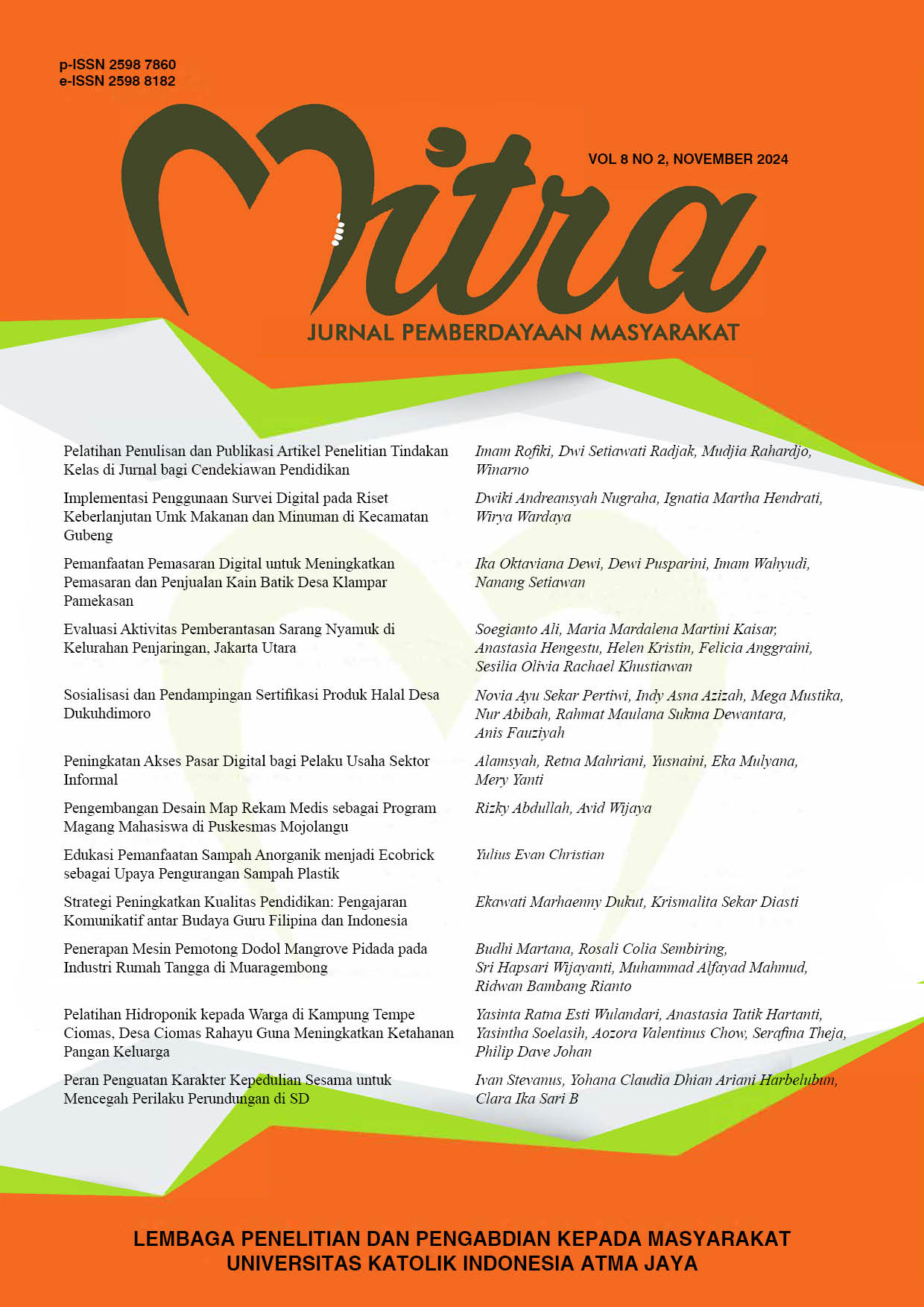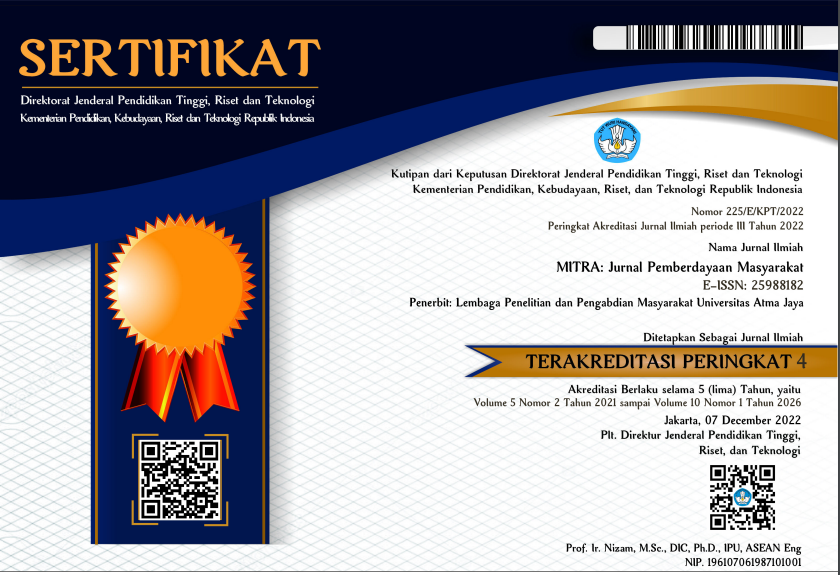Implementasi Penggunaan Survei Digital pada Riset Keberlanjutan UMK Makanan dan Minuman di Kecamatan Gubeng
DOI:
https://doi.org/10.25170/mitra.v8i2.5099Keywords:
CAPI; Digital Survey; SruveyCTO; MSEsAbstract
This service project aims to empower Micro and Small Enterprises (MSEs) in Gubeng District through the implementation of digital surveys. The primary objective of the project was to enhance research and data collection efficiency through the utilization of information technology, specifically by employing the CAPI survey method. The project included the creation of a tailored digital survey with the specific purpose of assessing the sustainability dimensions of the MSEs. This survey covered various factors such as products, service, management, digital aspects, and the role of the government. In addition, the project also aimed to conduct a digital survey to the respondents regarding the advantages of digital surveys. The use of a digital survey platform facilitates wider participation and makes it easier to collect data directly. The obtained data were statistically and qualitatively analyzed to produce a comprehensive insight into the sustainability dynamics of MSEs in the Gubeng Sub-district within the food and beverage sector. The advantages of implementing a digital survey include time, cost, and resource savings, as well as making it possible for researchers to achieve a more representative sample. The project's outcomes are expected to offer a comprehensive perspective on the sustainability prospects of Micro and Small Enterprises (MSEs) within the food and beverage industry. In addition, these results aim to offer insights to stakeholders involved in crafting policies and support initiatives.
References
Affandi, F. F., Silmi, F., & Nugroho, E. (2018). Analisis adopsi computer assisted personal interviewing pada survei di badan pusat statistik. Edu Komputika Journal, 5(2), 86–97. https://prosiding.stis.ac.id/index.php/semnasoffstat/article/view/1531
Baker, R. P. (1992). New technology in survey research: computer-assisted personal interviewing ( CAPI ) . Social Science Computer Review, 10(2), 145–157. https://doi.org/10.1177/089443939201000202
Baker, R. P., Bradburn, N. M., & Johnson, R. A. (1995). Wawancara pribadi berbantuan komputer : eksperimental evaluasi kualitas dan biaya data. 11(4). http://www.scb.se/contentassets/ca21efb41fee47d293bbee5bf7be7fb3/computer-assisted-personal-interviewing-an-experimental-evaluation-of-data-quality-and-cost.pdf
Caniago, A., & Rustanto, A. E. (2022). Kualitas pelayanan dalam meningkatkan minat beli konsumen pada UMKM di Jakarta (Studi Kasus Pembelian Melalui Shopee). Responsive, 5(1), 19. https://doi.org/10.24198/responsive.v5i1.39338
Couper, M. P. (2000). Usability evaluation of computer-assisted survey instruments. Social Science Computer Review, 18(4), 384–396. https://doi.org/10.1177/089443930001800402
Firmansyah, A. (2018). Kajian kendala implementasi E-Commerce di Indonesia. Masyarakat Telematika dan Informasi : Jurnal Penelitian Teknologi Informasi Dan Komunikasi, 8(2), 127. https://doi.org/10.17933/mti.v8i2.107
Fuchs, M., Couper, M. P., & Hansen, S. E. (2000). Technology effects: interview duration in capi and paper and pencil surveys. Developments in Survey Methodology Anuška Ferligoj and Andrej Mrvar (Editors) Metodološki Zvezki, 15. http://mrvar.fdv.uni-lj.si/pub/mz/mz15/fuchs.pdf
Kurniawati, N. (2020). Pengaruh digital marketing, aplikasi layanan pesan antar makanan, dan harga terhadap volume penjualan UMKM di Kota Semarang. Prosiding Seminar Nasional Unimus, 3, 1105–1114.
Monavia Ayu Rizaty. (2019). Terbanyak nasional, jumlah UMK makanan dan minuman Jawa Barat Capai 791,4 Ribu. Databoks, 2019, 1.
Novila Sari, P., Travilta Oktaria, E., Derina Yusda, D., & Desita Wengrum, T. (2022). Pelatihan manajemen keuangan bagi pelaku usaha umkm didesa mekar sari Kabupaten Mesuji. Jurnal Pengabdian UMKM, 1(1), 38–42. https://jpu.ubl.ac.id/index.php/jpu
Ondang, C., Singkoh, F., & Kumayas, N. (2019). Peranan pemerintah daerah dalam pemberdayaan usaha mikro kecil menengah (UMKM) di Kabupaten Minahasa (Suatu Studi di Dinas Koperasi dan UKM). Jurnal Eksekutif, 3(3), 1–10.
Rahmat, A., & Mirnawati, M. (2020). Model participation action research dalam pemberdayaan masyarakat. Aksara: Jurnal Ilmu Pendidikan Nonformal, 6(1), 62. https://doi.org/10.37905/aksara.6.1.62-71.2020
Sari, C. T., & Indriani, E. (2017). Pentingnya pembukuan sederhana bagi kelompok UMKM Kub Murakabi Desa Ngargoyoso. Wasana Nyata, 1(1), 17–21. https://doi.org/10.36587/wasananyata.v1i1.189
Takdir, T. (2019). Analisis kinerja, kualitas data, dan usability pada penggunaan CAPI untuk kegiatan sensus/survey. Jurnal Aplikasi Statistika & Komputasi Statistik, 10(1), 9. https://doi.org/10.34123/jurnalasks.v10i1.198
van Praag, C. M. (2003). Business survival and success of young small business owners. Small Business Economics, 21(1), 1–17. https://doi.org/10.1023/A:1024453200297
Watson, N., Wilkins, R., Watson, N., & Wilkins, R. (2012). Working Paper No . 6 / 12 experimental change from paper-based interviewing to computer-assisted interviewing in the HILDA survey experimental change from paper-based interviewing to computer-assisted interviewing in the HILDA survey * (Issue 6). https://papers.ssrn.com/sol3/papers.cfm?abstract_id=2018624
Yanto, A., & Sukanta, T. (2020). Analisis strategi bersaing dan strategi bertahan pada industri mikro dan kecil panganan keripik kemasan di kecamatan coblong kota Bandung Jawa Barat tahun 2020 ditengah situasi sulit penyebaran pandemi nCoV-19. JSMA (Jurnal Sains Manajemen Dan Akuntansi), 12(1), 37–53. https://doi.org/10.37151/jsma.v12i1.48
Downloads
Published
Issue
Section
License
Copyright (c) 2024 Dwiki Andreansyah Nugraha, Ignatia Martha Hendrati, Wirya Wardaya

This work is licensed under a Creative Commons Attribution-NonCommercial-ShareAlike 4.0 International License.
This license allows reusers to distribute, remix, adapt, and build upon the material in any medium or format for noncommercial purposes only, and only so long as attribution is given to the creator. If you remix, adapt, or build upon the material, you must license the modified material under identical terms.



_.jpeg)

.png)
2.png)
.png)
.png)



